
The Vienna Psychoanalytic Association
The Vienna Psychoanalytic Association (VPA, in German: Wiener Arbeitskreis für Psychoanalyse) is a scientific society for the advancement of psychoanalysis. We are a training institution, operate an outreach clinic and organise a regular scientific programme as well as scientific projects. With our 90 members and 50 candidates we represent the second largest psychoanalytic society in Vienna and Austria and are going to commemorate our 70th birthday in 2017.
The past 30 years were marked by a strong growth of our association. During these three decades the number of members of the VPA has more than tripled. Since 2013 the Vienna Psychoanalytic Association is a component society of the IPA, after an accession process of 14 years. Today we are a training institution in both classical high frequency psychoanalysis and in psychoanalytic psychotherapy. Apart from that, the Association is operating an outreach clinic that provides an initial psychoanalytic consultation and a referral service to patients seeking psychoanalysis.
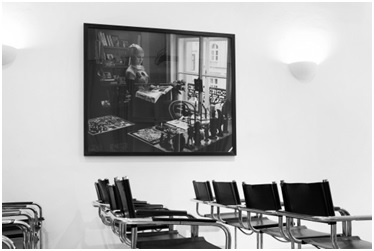 One of the lecture rooms of the Vienna Psychoanalytic Association with the art photography of Lisl Ponger (2006) “Die Beute”. One of the lecture rooms of the Vienna Psychoanalytic Association with the art photography of Lisl Ponger (2006) “Die Beute”.
|
Consultation room of the outreach clinic of the VPA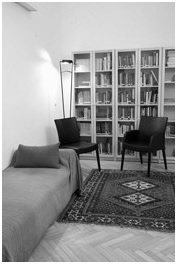
|
After a process of convergence over the last decade, the two Viennese IPA-societies, the Vienna Psychoanalytic Association and the Vienna Psychoanalytic Society, are today close partners in many projects. Together we are organising a joint curriculum for the new candidates of both societies since last October. In addition to this, both societies conjointly are running the Vienna Psychoanalytic Academy, which fulfils the tasks of organising advanced and continuing psychoanalytic education, clinical seminars and scientific psychoanalytic symposia.
Furthermore, we are glad to serve as an organizing partner of the largest German speaking international psychoanalytic conference, the DIPSAT, that will take place in Vienna in October this year (for details, see dipsat.wien).
Folder for the German-speaking Psychoanalytic Conference 2016, which is organised by the VPA in October this year in Vienna.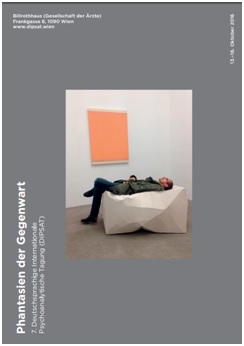
|
History
The Vienna Psychoanalytic Association developed from a problematic background and origin in the 1940s and had to undergo a substantial process of transformation before it emerged as an authentic psychoanalytic society in the 1980s.
Our organisation was founded in 1947 under the name „Wiener Arbeitskreis für Tiefenpsychologie“ (Vienna work group for depth psychology) by Igor Alexander Caruso, a pedagogue of Italian-Russian descent. Caruso had fled from Estonia to Austria in 1941, when (as a consequence of the Hitler-Stalin-pact) soviet troops had occupied that country. In Austria he got to work in a psychiatric facility for children, which was a place where the Nazis implemented their later so-called “action T4”, a program of forced “euthanasia” of disabled adults and children. Between 1941 and 1945 more than 788 children and adolescents were murdered there.
During the period when Caruso had worked in that facility, i.e. between February and October 1942, he wrote some 100 psychological evaluations about sick and disabled children, 14 of whom were later murdered. Although the final decision about killing was taken by the physicians, Caruso was clearly part of this cynical and murderous system. Details about these events can be found in List, E. (2008): „Warum nicht in Kischniew?“ – Zu einem autobiographischen Tondokument Igor Carusos. Zeitschrift für psychoanalytische Theorie und Praxis 23 Jg., Heft 1/2, 117-141 (http://zptp.quotus.org/article/zptp/2008/1-2/7).
In early 1944 Caruso became a candidate at the so-called “Reichsinstitut for psychological research and psychotherapy”, where the single active member of the former Vienna Psychoanalytic Society, August Aichhorn, taught and offered training analyses. But, it seems that Aichhorn had rejected Caruso as an analysand because of the latter’s (Or simply his) relationship with the well-known NS-psychiatrist Alfred Auersperg. Contrary to Caruso’s self-portrayal, Caruso did not acquire any other proper psychoanalytic training until he founded the Wiener Arbeitskreis für Tiefenpsychologie in 1947.
In the early years, this Arbeitskreis consisted mainly of people who had collaborated with the Nazi regime, many of whom had been members of the NSDAP. Most of them had a strong catholic religious background as well.
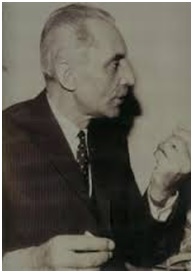 Igor Caruso, founder and president of the Wiener Arbeitskreis for the first 20 years. He started out with an amalgam of Freud-Jungian “depth psychology” and Christian existentialism and later blended these ideas with elements of Marcusian “critical theory”. Igor Caruso, founder and president of the Wiener Arbeitskreis for the first 20 years. He started out with an amalgam of Freud-Jungian “depth psychology” and Christian existentialism and later blended these ideas with elements of Marcusian “critical theory”.
|
Caruso only began to read Freud in the years after the second world war. He based the perspective of the Arbeitskreis on the so-called „grand masters of depth psychology “, who included for him, Carl Gustav Jung and Ludwig Binswanger. Caruso adopted an abstract understanding of the unconscious from the Daseinsanalytical tradition, but he kept a clear distance from Freud’s libido theory and anti-religious, scientific stance.
Caruso proposed a modified clinical technique which should limit the extent of regression in the context of training analysis: it should take place only two to three times a week, the candidate should write up minutes of analytic sessions and produce drawings of his dreams, which should then be discussed in the subsequent session.
During the 1960s and 1970s the proportion of Sigmund Freud’s writings increased in the training seminars of the Arbeitskreis, whereas Jung’s work dropped off the reading lists. Before and after Caruso left Vienna in 1968, the Wiener Arbeitskreis began to develop a strong interest in group theory and group dynamics. Raoul Schindler, the first president of the “Arbeitskreis” after Caruso, received international recognition for developing a model of hierarchical group positions (“Rangordnungsdynamik”). In clinical terms he represented the Arbeitskreis-tradition of limited regression and neglect of transference-analysis.
At the same time, the Arbeitskreis slowly began to import psychoanalytic experiences from abroad. Josef Shaked was a decisive figure in this development. An idea of psychoanalysis emerged in the Arbeitskreis that recognised the enormous deficits in psychoanalytic training and self-reflection that had resulted from our tradition.
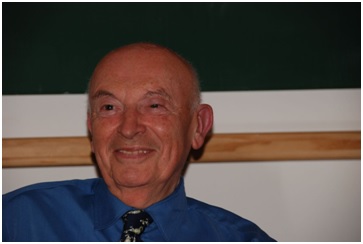 Josef Shaked, training analyst and president of the Wiener Arbeitskreis, supported and facilitated a Freudian development of the group since the 1970s. Josef Shaked, training analyst and president of the Wiener Arbeitskreis, supported and facilitated a Freudian development of the group since the 1970s.
|
It was a complex combination of influences that pushed the Vienna Arbeitskreis further into the direction of authentic psychoanalysis: there was the reception of international literature, there was the impact of international conferences and congresses, of international experiences in intervision groups and in group psychoanalysis, there were „underground“ contacts between members of the Wiener Arbeitskreis and members of the Vienna Psychoanalytic Society, and more recently, there were members seeking supervision in Great Britain or in other European countries with a continuous and ongoing psychoanalytic tradition.
All these factors promoted a development that led to internal conflicts and even splits. In 1985 Elisabeth Mayer took over the presidency of the Wiener Arbeitskreis für Tiefenpsychologie and reoriented the group in a clearly Freudian way.
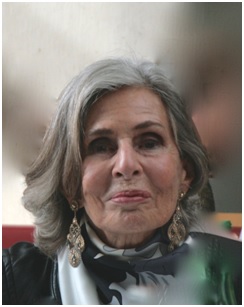 Elisabeth Mayer, president 1985-1989. Under her leadership, the “Wiener Arbeitskreis für Tiefenpsychologie“ was renamed as “Vienna Psychoanalytic Association” and decisively improved its standards for psychoanalytic training. Elisabeth Mayer, president 1985-1989. Under her leadership, the “Wiener Arbeitskreis für Tiefenpsychologie“ was renamed as “Vienna Psychoanalytic Association” and decisively improved its standards for psychoanalytic training.
|
Four weekly sessions became the standard of training analysis and of the control cases, minutes and drawings were definitively abolished, and – last but not least – the name of the group was changed to Wiener Arbeitskreis für Psychoanalyse (Vienna Psychoanalytic Association) in 1988.
In the following years, several people left the Arbeitskreis in three consecutive splits. After the decision to orient the Association towards accession to a membership of the IPA in 1999, another group of members left and founded the Sigmund-Freud-University where they began to continue some of the syncretistic traditions of the early Arbeitskreis für Tiefenpsychologie.
The process of evaluation and transformation of the Vienna Psychoanalytic Association on its way to full membership in the IPA took 14 years. Walter Parth, (together with his team, most notably Marianne Scheinost-Reimann as deputy-president and Brigitte Grossmann-Garger as director of training) took the initiative and led the VAP through the first stages of the accession process.
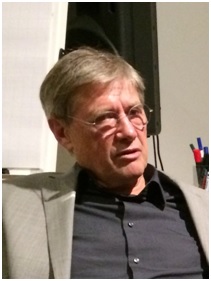 Walter Parth, president of the VPA between 2000 and 2007. He promoted the decision in the direction of IPA membership and the implementation of the accession process. In 2009 the VPA was accepted as provisional society of the IPA. Walter Parth, president of the VPA between 2000 and 2007. He promoted the decision in the direction of IPA membership and the implementation of the accession process. In 2009 the VPA was accepted as provisional society of the IPA.
|
What followed were more than a twenty visits of the IPA-site-visit- and liaison committees, discussions of lots of case presentations and evaluations of all members and training analysts. Too many members were active in this process to be mentioned here by name. These were years of hard work and continuous innovation, of drawing up a new curriculum for psychoanalytic training, of increasing cooperation with our Vienna sister society in the IPA and of beginning integration into the scientific life of the IPA and the EPF. Simultaneously, since those years (not least thanks to the initiative von Eveline List) the discussion and reflection upon the entanglement of our founder in the NS-euthanasia-program and the problematic heritage of our society was initiated. This process is still going on.
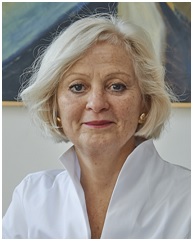 Eveline List was the main researcher and initiator of a reflection process on the involvement of Igor Caruso in Nazi- “euthanasia” and the sequelae of this in the “Wiener Arbeitskreis” Eveline List was the main researcher and initiator of a reflection process on the involvement of Igor Caruso in Nazi- “euthanasia” and the sequelae of this in the “Wiener Arbeitskreis”
|
The Vienna Psychoanalytic Association Today
Today the Vienna Association of Psychoanalysis represents a modern psychoanalytic society with a wide range of activities and projects. Members and candidates come from different professional backgrounds ranging from psychiatry and psychology to history, literature, philosophy, economy and the arts. Due to this wide spectrum of educational and professional backgrounds of members and candidates, the occupation with psychoanalysis within the Association ranges from clinical psychoanalysis, psychoanalytic psychotherapy, child analysis, group analysis to applied fields such as fine arts, film, music, social and cultural theory and management. August Ruhs was and is a leading initiator in these areas.
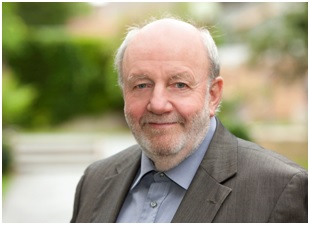 August Ruhs, president of the VPA 2007-2015, brought the accession process to a successful end. 2013, at the IPA-congress in Prague, the VPA became a full component society. August Ruhs, president of the VPA 2007-2015, brought the accession process to a successful end. 2013, at the IPA-congress in Prague, the VPA became a full component society.
Ruhs is a strong representative of applied psychoanalysis within the VPA.
Foto: Felicitas Matern
|
Nevertheless, our core activities as a psychoanalytic society are centered upon clinical issues and focus on the
- psychoanalytic training, based within the Eitingon model,
- supplementary training for children-and-youth-psychotherapy as well as for child-analysis
- ·outreach clinic for initial psychoanalytic consultation, both for adults and children, youths and their parents.
- scientific debates and participation in editing two psychoanalytic journals: “texte”, the only Austrian psychoanalytic quarterly, which has an applied and culture-theoretical focus, and the international German-language “Zeitschrift für psychoanalytische Theorie und Praxis” with a clinical-theoretical focus.
Furthermore, members of the VPA are engaged in scientific projects, some of them supported by public research funds (e.g. http://stuzzicadenti.at/wwtf-projekt/; https://www.meduniwien.ac.at/hp/psychoanalyse/forschung/topographien-des-koerpers/ ). There is a series of formal and informal working groups in the VPA that explore diverse aspects of clinical and applied psychoanalysis representing a lively and cooperative understanding of our discipline.
In 2006 the Vienna Psychoanalytic Association and the Vienna Psychoanalytic Society cofounded the Psychoanalytic Academy as a publicly accessible facility for psychoanalytic education and research. It consists of two departments:
- Clinical education and training
The task of this department is to organise a basic education for future psychotherapists (“Propädeutikum”) and advanced education and training in psychoanalytic oriented psychotherapy, psychoanalytic oriented trauma therapy and psychoanalytic oriented parent-infant-therapy. Furthermore, this department provides clinical seminars and courses e.g. in structural psychoanalysis (Lacan), Bionian thinking, or psychodynamic diagnostics.
- Science and research
Apart from its educational agenda, the Psychoanalytic Academy pursues as well a scientific and research focus. Scientific conferences and symposia serve the purpose of both revisiting and spreading basic psychoanalytic concepts and theories. Furthermore, research projects in the history of psychoanalysis have been undertaken. For the future, we have established a research funds that will support the best local research projects in all fields of psychoanalytic investigation, be they clinical, extra-clinical, conceptual, historical or interdisciplinary.
Our strategic goals for the years ahead
Recently we held a conference on “Psychoanalysis and the University – Reality and Utopia”, with important international experts in this area, like Mark Solms, Marianne Leuzinger-Bohleber and Martin Teising.
This was part of our preparation for one of our most important and strategic projects: the so-called “academization” of psychoanalytic education and its cooperative integration into a university study program. Psychoanalytic training in Vienna should simultaneously allow for three objectives in the future:
- to become a clinical psychoanalyst and an IPA-member,
- to get the state allowance for working clinically with patients and for contracting with the social insurance companies,
- to receive a master-of-science-degree from the Medical University of Vienna (MUW).
Psychoanalytic training should be done in a fine tuned cooperation between the psychoanalytic societies and the Medical University of Vienna.
In October 2015, the Vienna Psychoanalytic Association and the Vienna Psychoanalytic Society already began to offer the theoretical training courses for candidates of both societies together. Based on this positive experience we plan to start a university course in cooperation with the MUW in the autumn of 2017. This project is one of the main priorities for the new president of the VPA, Fritz Lackinger.
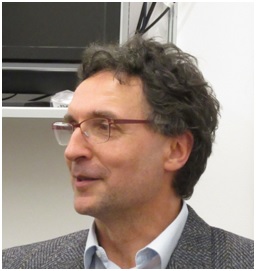 Fritz Lackinger, president of the VPA since 2015. The priorities of his presidency lie on the improvement of relations between psychoanalysis and university, and on reprocessing and reflecting historical responsibilities and the development of the VPA. Fritz Lackinger, president of the VPA since 2015. The priorities of his presidency lie on the improvement of relations between psychoanalysis and university, and on reprocessing and reflecting historical responsibilities and the development of the VPA.
|
Education in psychoanalytic concepts and theory, research training in both empirical and theoretical studies and clinical internship will all be done within the university and its hospital. Training analyses, supervision of control cases and clinical discussion groups will be done within psychoanalytic institutes.
This will represent a fundamental change to our psychoanalytic training model and will hopefully enhance and enlarge the possibilities of integrating clinical, conceptual and extra-clinical research activities into psychoanalytic training. Thus we hope to improve the standing of psychoanalysis within the public-health-sector and its appreciation by the social insurance system. At the same time, psychoanalysis, as a distinct discipline with its very specific methodological approach, should find optimal conditions both for its internal scientific development and its interdisciplinary dialogues.